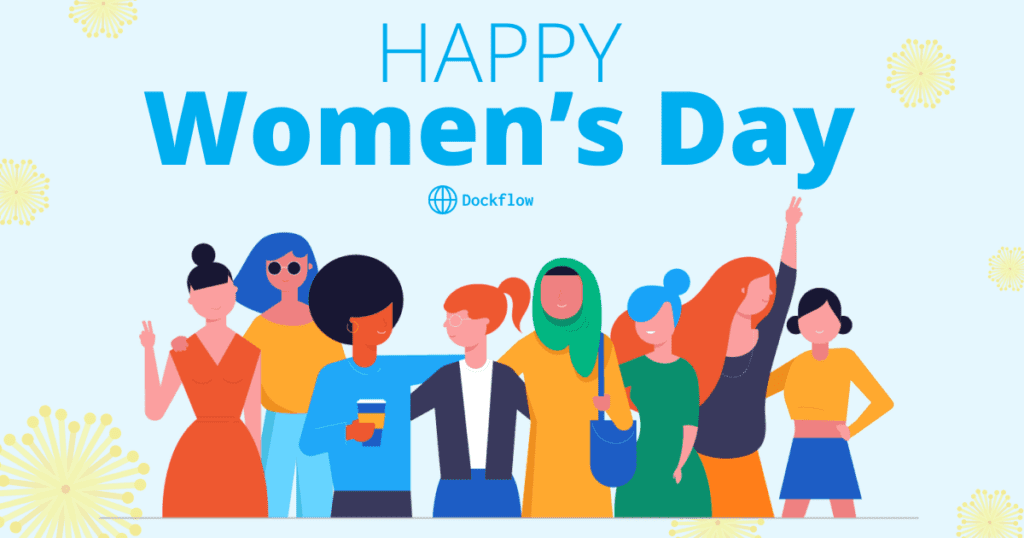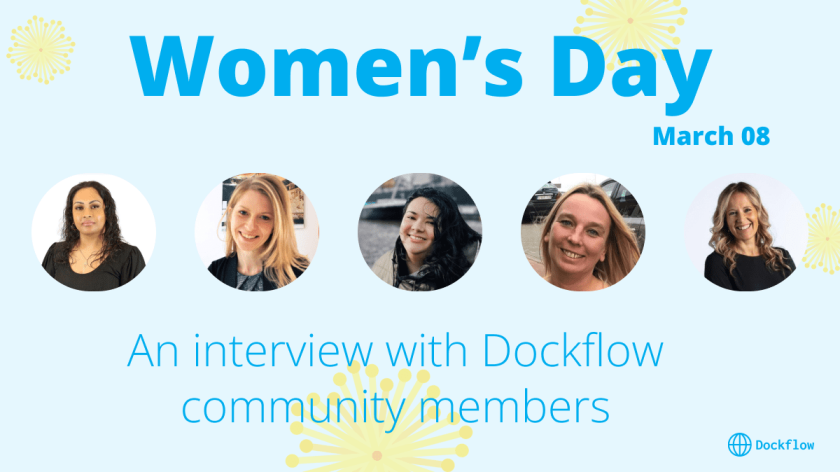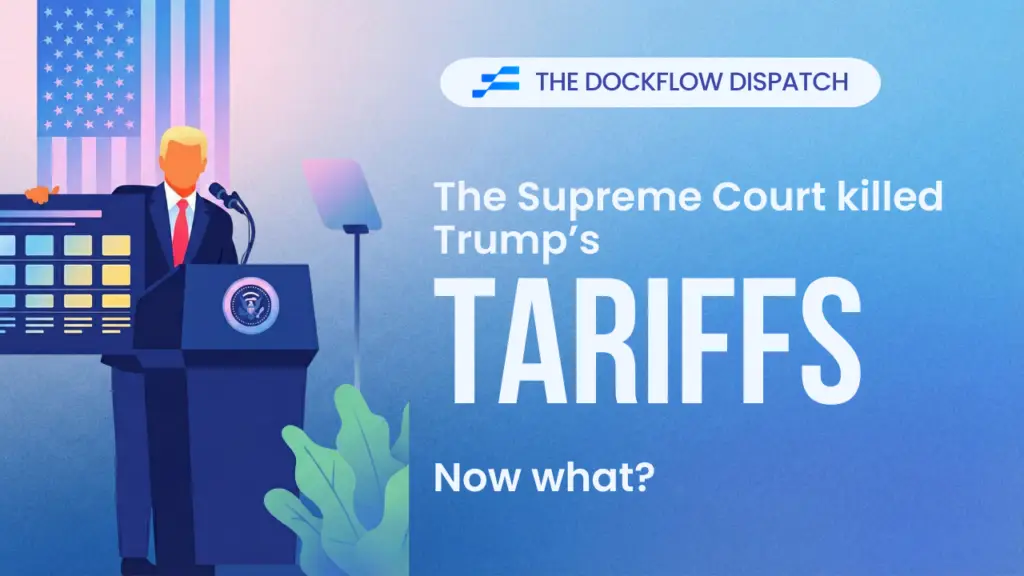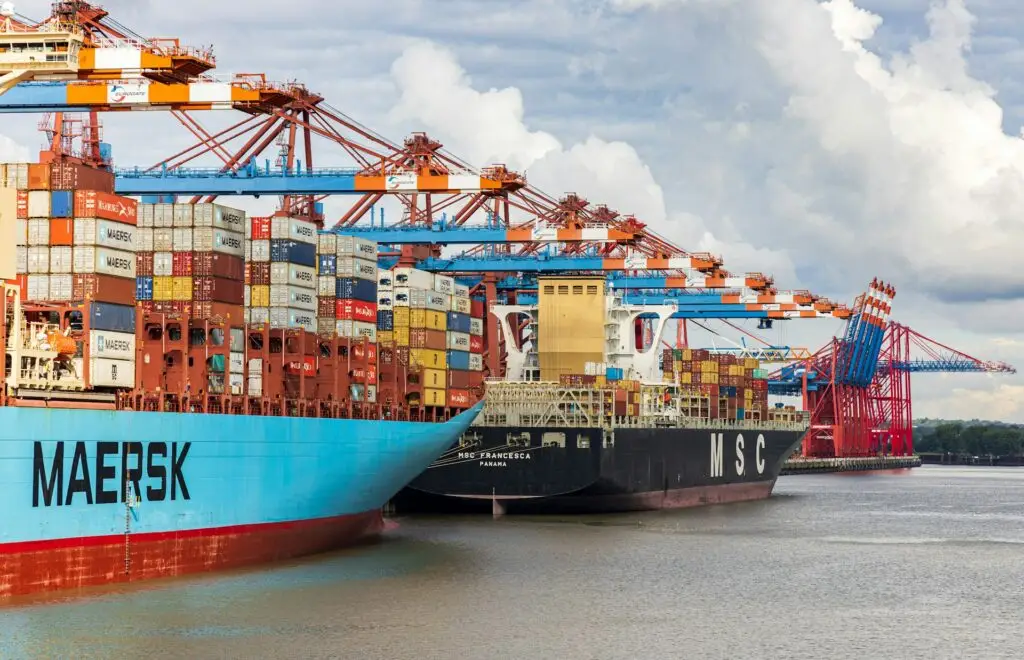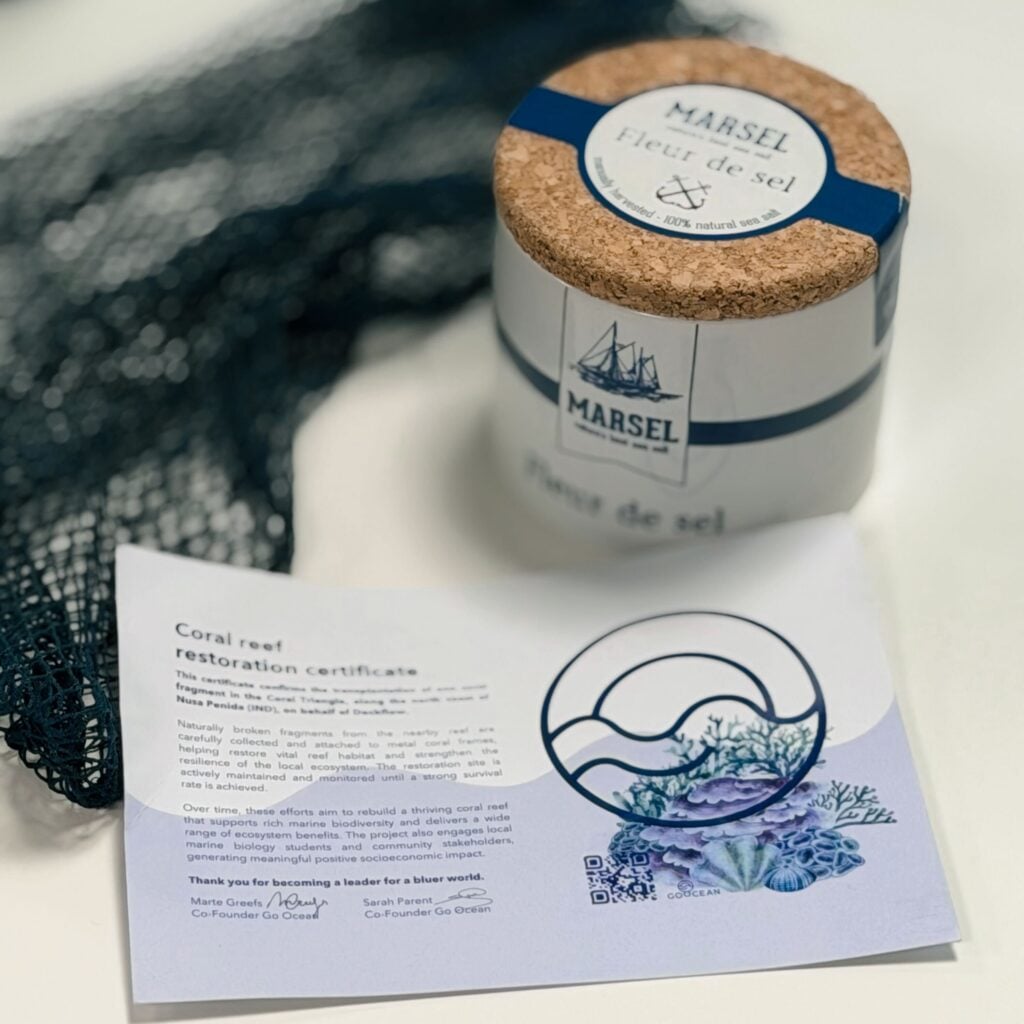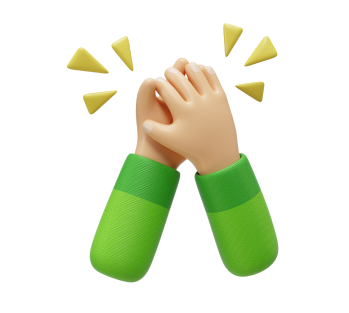The history of International women’s day could date back to the early 1990s when women in Europe and the United States were fighting for their rights and gender equality. Today, International Women’s Day is celebrated annually worldwide with marches, rallies, and events to honor women’s social, economic, cultural, and political achievements and also to promote gender equality.
This year, to celebrate International Women’s day, we interviewed 5 members of the Dockflow community:
- Wendy Rampersad (Logistics Manager at ArdoVLM)
- Tamara Tanghe (Director and owner of Commodity Centre Belgium)
- Monika Matusiak (Procurement Manager at Remant Cool Logistics)
- Lieve Donckers (Forwarding Manager at Trans-Continental Logistics)
- Pauline Van Ostaeyen (Co-founder of Dockflow)
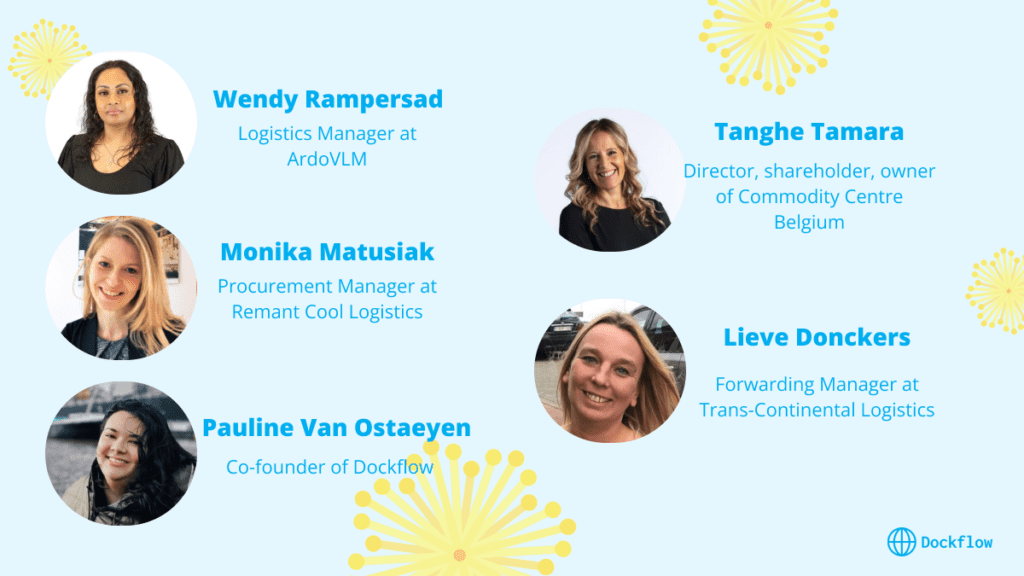
Want to know more about their stories and perspectives on gender equality in the industry? Let’s find out together!
Q1 : What is your proudest achievement while working in the industry?
Tamara Tanghe : Being the owner and managing director of Commodity Centre Belgium (together with my male colleague), which is a company started 10 years ago in the port of Antwerp.
Wendy Rampersad : Managing to not let being a mother get in the way of my career. My promotion of becoming manager came after I had kids (while they were babies). It’s very hard to find the right balance between Supermom and being a leader or manager within this industry. Especially in such a fast-paced environment. At times I didn’t think it was possible but I did and am doing it. If you believe in yourself the rest will come 😉. A lot of women feel that becoming a mother sets them at a disadvantage as sad as I am to admit. Becoming a mom was actually my purpose for pushing harder to be that role model I want my kids to have.
Monika Matusiak : In our industry and everyday work, there’re hardly any achievements that could be assigned to one single individual. No matter if it’s transport planning, its execution, value-added services, or consultancy – it is always a result of teamwork. The biggest achievement of Remant Cool, in my eyes, is that we’ve stayed solid during the challenging times of the pandemic, and we came out stronger.
Lieve Donckers : Every day is an achievement, but honestly getting demands from customers right, with the little workload from my team, and getting cargo safely where it needs to be give me great satisfaction.
Pauline Van Ostaeyen : Definitely whenever I hear users say anything along the lines of “Dockflow has really helped me”. Because we’ve put so much effort into working closely with the people who actually get the work done. They’ve been bombarded with software tools that don’t make their lives easier, so it’s very satisfying to see that we’re making an impact.
Q2 : Which women inspire you the most?
Wendy Rampersad : Rosa Parks. She stood up for what she believed in no matter what the odds and consequence will be. This speaks to me as I’m known for being passionate about what I truly believe in with no fear when I truly believe in the cause.
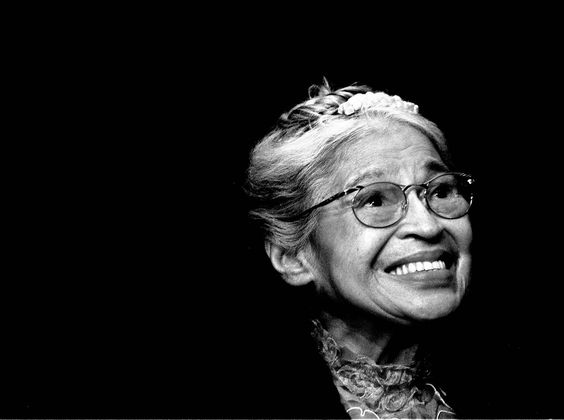
Monika Matusiak : Women who are independent, determined, and living their values. I could name a few, but I’ll limit this answer to Maria Sklodowska (Marie Curie). She has never given up her passion, while confronted with a lot of obstacles, proving herself in a world dominated by men.
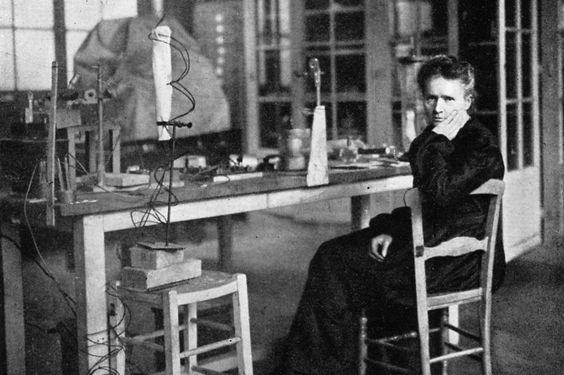
Lieve Donckers : Those who don’t see themselves as any different from a man.
Tamara Tanghe : Lady Diana. Her quote “Everyone needs to be valued, everyone has the potential to give something back” is something I’ll always keep in mind, with people, employees and customers.
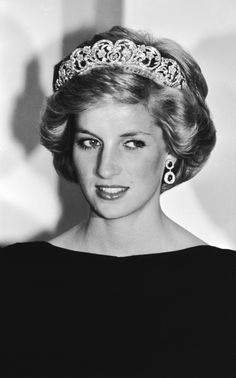
Pauline Van Ostaeyen : My perspective on this comes from Dewi Van De Vyver: it’s important to have role models for every level of your career or your life. When just getting started, comparing yourself to let’s say Angela Merkel won’t help you much. Besides the more famous leaders, I also draw inspiration from people closer to my reality. Some women at every level who inspire me now are Jolanda Schekermans, Carole Lamarque, Dafne Sartorio, Kristel Groenenboom, Diane Govaerts, Londy Ngcobo, Amélie Matton and Jacinda Ardern. Go give them a follow!
Q3 : How can we improve equality in the workplace?
Monika Matusiak : By creating the mechanisms, which take away or at least soften “the burden” of maternity. Combining private family life with a job career is in my opinion the showstopper for a lot of talents. It still very often is a choice between those two. Some countries are much stronger than others in introducing legal and social solutions. The paradox is actually that one of the tools stimulating women’s careers, is giving men the possibility to exercise parental skills. In this respect, there is still a lot of rooms for improvement in many European countries.
Lieve Donckers : That’s a difficult question since I tend to see equality already, you just don’t have to make a difference yourself…
Tamara Tanghe : Providing fair allocations of workload amongst employees. Keep job opportunities in every function open for women and dare to think out of the box. Every job can be done by anyone and there might be some potential if women will do something men have been doing for years.
Pauline Van Ostaeyen : So many companies think “let’s hire some women and people with foreign-sounding names, post a black square and a rainbow on social media and then we’re done, right?”. Don’t be a hypocrite: either practice what you preach. Or change your speech, that’s also fine by me. Having a mix of different people in your company is just the first step, the bare minimum. Make sure everyone is heard, be mindful of bias (everyone does it, me too) and get diversity in top-level management positions. And in the end, we as people tend to focus on differences but really you usually have much more that unites you vs. what divides you. That’s why it is so important to have a strong company culture, strategy and values. Be radically open-minded to others and go easy on the assumptions.
Wendy Rampersad : Create a culture of fairness and inclusion, appropriate diversity, and inclusion training for all staff and teams to support each other.
Q4 : What advice would you give to women who want to work in this industry?
Pauline Van Ostaeyen : Go ahead and ask other women for help. I made the mistake of not doing this early enough. So many women, especially with experience and connections, are willing to help you out. You’ve just got to ask!
Lieve Donckers : As in every other job, go for what you like doing.
Tamara Tanghe : Be brave, learn, listen, and go into a proper discussion with different insights.
Wendy Rampersad : Opportunities don’t happen, you create them. I live to love my family, work hard and live my passion. When you find your passion, “work” doesn’t feel like work anymore…
Monika Matusiak : Be yourself and speak up. Do not adapt to the surroundings, but rather adopt behaviors that are compliant with your values.
Women have historically been underrepresented in logistics, but there is a recognition of the need for more gender equality in this industry. Like any other sector, promoting greater gender diversity in logistics and #LogTech is essential for creating a more equitable and inclusive industry that can better serve the needs of business and society as a whole.
